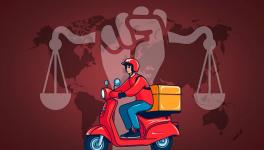Soaring Fuel Prices Compound App-Based Workers’ Woes
New Delhi: There is always one or the other thing that keeps Luvkush Tiwari worrying, ever since he started working for a foodtech unicorn as their delivery agent back in 2018.
“The expenses are always increasing, yet there has never been any fixed income to cover them fully,” says the Delhi-based 25-year-old.
Tiwari’s words provide a sneak-peak into economics of the gig world that is marked with dwindling incentives and surging commission percentages – dynamic calculations which are pushing myriads like Tiwari to earn a precarious living.
In this backdrop, the recent hike in fuel prices is only the latest to compound Tiwari’s woes. On Monday, March 1, a litre of petrol was costing Rs. 91.17 in the national capital, while prices across the country hover around the same value point, even reaching Rs 100 in some places. Only two months ago, at the start of January, petrol cost Rs. 83.71/litre.
The latest price hike is a body blow to the household budget according to Tiwari, for whom delivering food is the primary source of income, fetching not more that Rs. 15000 per month. “Earlier, filling Rs. 200 worth petrol was enough for me to drive my bike for nearly 14 hours; now for the same period, I am having to pay Rs 350-400.” There is also very little support from the company management, he added.
Tiwari, who uses his two-wheeler to deliver food, didn’t want the name of the company to be disclosed, fearing retribution. The food delivery segment is, however, mostly recognised by the likes of Zomato and Swiggy.
If it is only petrol prices for the delivery boys, the app-based drivers – associated largely with Ola and Uber – are also feeling the pinch of hike in prices of both petrol and diesel– the latter increased by over Rs. 7 per litre in the past two months.
Shaikh Salauddin, national general secretary, Indian Federation of App-Based Transport Workers (IFAT), said on Monday that even before the rise in fuel prices, these workers were demanding an increase in “per/km charges” - rates based on which the earnings of an app-based worker is determined – but to no avail.
“During the lockdown there has been a wave of protests by app-based food delivery workers and cab drivers. At that time, company officials gave verbal assurances that the earning of workers will improve once normalcy is restored,” Salauddin told Newsclick over phone from Hyderabad.
He rued that even though now the business of these companies is “well restored” to “pre-pandemic levels”, the workers are being deprived of their “fair share”.
Similarly, Kamaljeet Gill, president, Sarvodya Drivers Association, a Delhi-based union representing Ola and Uber drivers here, flayed the Narendra Modi –led Central government for “adding more problems to the already difficult life of a cab driver.”
“This was the government which had promised to bring down petrol-diesel prices and just look at what they are doing now,” said Gill. He added that over 100 drivers will lead a “token march” on March 5 in protest against the hike in fuel prices at Barakhamba Road in Delhi.
“We, along with other unions in Delhi, are planning to organise a bigger protest on March 22 as well,” he further claimed.
To be sure, and if media reports are to be believed, it is not as if the soaring fuel prices have gone completely unnoticed by app-based companies, in particular by the food-delivery giants.
Last week, in a bid to cushion the burden, Zomato reportedly revised its pay structure for the delivery boys associated with the company – an additional remuneration component of distance pay. Likewise, Swiggy also raised ‘minimum base pay’ to its delivery agents from Rs. 15 to Rs. 20, Newsclick has learnt.
But the question still remains whether these moves are enough? “It is nowhere attractive because already over the years these firms have cut the rates to lower levels,” Salauddin of IFAT said.
A Delhi-based delivery boy had a different take. According to him, it is not just the surge in fuel prices but also the rise in prices of other consumables like dal, chawal (pulses and cereals) that puts pressure on household budgets.
“This is a double brunt that we are having to bear. Who will compensate for that?” he asks.
Get the latest reports & analysis with people's perspective on Protests, movements & deep analytical videos, discussions of the current affairs in your Telegram app. Subscribe to NewsClick's Telegram channel & get Real-Time updates on stories, as they get published on our website.






















